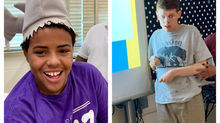Unleashing Abilities: The Beauty of Presuming Competence.
- Ingrid Ventura Ellis
- Mar 4, 2024
- 3 min read
When I first learned about the concept of presuming competence in school, it was only briefly mentioned. I wished my teacher had given us an assignment on how to actually implement it.
Such experience would have been more helpful in understanding the meaning behind it, and most importantly I would have been more mindful of my teaching practices and applying it more consistently.
Now I understand that presuming competence means to assume that a person has the capacity to do, think, learn, and understand, even if they don’t show clear or “real” evidence of such abilities.
In the case of my autistic students/clients, it means assuming that they are not incapable, but rather that they simply need the right supports and systems to help them succeed. Finding the right support to help my students in developing their skills brings me immense fulfillment.
It is fundamental to remember this concept and, more importantly, to find ways to practice it not only in the academic setting, but also in our everyday interactions and practices.
I have been reminded by my own students to have more faith in their abilities. For instance this month, while observing one of my students working on typing with the keyboard on the table, I noticed she was struggling to finish her sentence. I offered to help by holding the keyboard, but she declined.
It was then that I realized she was rising to the occasion and wanted to complete the task on her own. I didn’t think she was quite ready, but she proved me wrong.
Every day, we are reminded of the importance of teaching students to generalize tasks, showing them how to do things independently, and promoting autonomy. While these can be valid goals, it is important to remember that no two individuals will reach them in the same way or achieve the same results.
Autistic individuals may experience challenges in translating their internal intentions into external actions, such as speech and movement execution. Movement difficulties and praxis (the ability to execute skilled, goal-directed movements) may very well have a correlation to social, communicative, and body regulation challenges faced by autistics (Hussman, 2016).
What truly matters is finding ways to remember to practice presuming competence and to support individuals in ways that help them feel safe and confident while working towards their personal goals at their own pace.
It is evident that some students may struggle with impulse control or rigid thinking and may not be fully aware of their own potential. It is a significant breakthrough when we all discover the right supports, strategies, and systems that enable us to learn and grow together.
Here are some ways we can be mindful everyday to presume competence, have more ideas? Please share them.
Want more ideas? Consider taking the course or different modules of Communication for Education.
Examine the quality of our teaching efforts, how frequently we offer learning opportunities, and be consistent with high expectations.
Remember how patient we are in resolving difficulties while teaching skills.
Recognize that many students are dealing with problems of executing complex motor tasks, not necessarily problems of cognition. (Communication for Education, Module 3)
Let’s be detectives and find motor pathways to teach life skills, sports, hobbies, etc.
Celebrate the progress and growth, no matter how small.
Ask for help and make changes
Offer guidance and encouragement to help overcome challenges.
Continue teaching others about presume competence.
Sources:
Communication for Education, Module 3. Presume Competence.
Hussman, John P., 2016, The gap between intention and action: altered connectivity and GABA‐mediated synchrony in autism, in Torres Elizabeth, Ed., Autism: The Movement Sensing Perspective.



























.png)

.png)



.png)


Comments